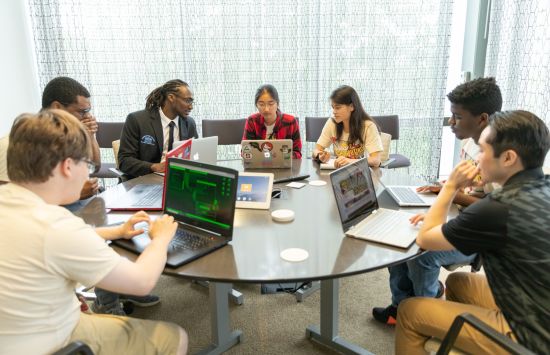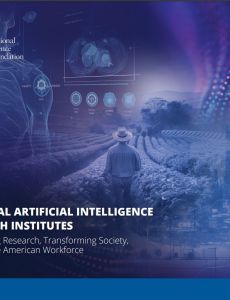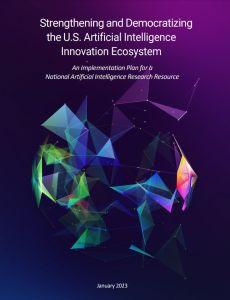The U.S. National Science Foundation has invested in artificial intelligence research since the early 1960s, setting the technical and conceptual foundations driving today’s AI innovations.
AI-driven discoveries and technologies are transforming Americans' daily lives and promising practical solutions to global challenges, from food production and supply chains to healthcare and education. As a major federal funder of AI research, NSF is making investments that will catalyze new discoveries, translate this knowledge into the hands of the American enterprise and build the workforce needed to drive U.S. global leadership and economic competitiveness.
 On this page
On this page
What is artificial intelligence?
How does AI affect our daily lives? How does it work in simple terms? Can we trust AI chatbots? In this 10-minute video, Michael Littman, NSF division director for Information and Intelligent Systems, looks at where the field of artificial intelligence has been and where it's going.
Brought to you by NSF
NSF's decades of sustained investments have ensured the continual advancement of AI research. Pioneering work supported by NSF includes:
Reinforcement learning
Which improves the conversational ability of chatbots and trains self-driving cars, among other uses.
Neural networks
Which enable computer understanding of human speech and the analysis of visual scenes.
Large language models
Which power generative AI systems like ChatGPT.
Collaborative filtering
Which fuels content recommendation on the world's largest marketplaces and content platforms, from Amazon to Netflix.
AI-driven learning
Which has led to the development of virtual teachers (both digital and robotic) that incorporate speech, gesture, gaze and facial expression.
What we support
With investments of over $700 million each year, NSF is:

Fostering the next-generation of breakthroughs
We invest in fundamental AI research, accelerate AI-powered discovery across all fields of science and engineering and deepen the understanding of economic and societal implications of widespread AI adoption.

Translating AI research to impact
We expand pathways to transition AI innovations into practice and power regional innovation and economic development.

Empowering AI innovation through research infrastructure
We provide the research community with access to integrated computational, data and software resources with hands-on support and training.

Building a world-class workforce for the AI era
We invest in the creation of educational tools, materials, curricula, scholarships and fellowships to enhance learning and create an AI-ready workforce.

Forging partnerships to accelerate progress
We partner with other federal agencies, industry and nonprofits to leverage expertise; identify use cases; and improve access to data, tools and other resources.
National AI Research Institutes
Launched in 2020, the NSF-led National Artificial Intelligence Research Institutes program consists of 27 AI institutes that connect over 500 funded and collaborative institutions across the U.S. and around the world.
The AI institutes focus on different aspects of AI research, including but not limited to:
- Foundations of machine learning.
- Agriculture and food systems.
- AI and advanced cybersecurity.
- Human-AI interaction and collaboration.
- AI-augmented learning.
Learn more by reading the 2020, 2021, 2023 and 2024 AI Institutes announcements or visiting the AI Institutes Virtual Organization.
National AI Research Resource Pilot
As part of the "National AI Initiative Act of 2020," the National AI Research Resource (NAIRR) Task Force was charged with creating a roadmap for a shared research infrastructure that would drive AI innovation and discovery by providing U.S.-based researchers, educators and students with significantly expanded access to computational resources, high-quality data, educational tools and user support.
The NSF-led interagency NAIRR Pilot brings together government-supported, industry and other contributed resources to demonstrate the NAIRR concept and deliver needed resources to the U.S. research and education community, including the full range of institutions of higher education and federally funded startups and small businesses.
The NAIRR Pilot is accelerating AI and AI-driven science in areas such as:
- Improving the accuracy, quality and robustness of AI models.
- Enhancing AI model security.
- Early detection of agricultural pests .
- Assessing personalized risks for Alzheimer’s disease.
- Facilitating robotic movement through deep vegetation.
Developing the AI workforce of the future
NSF programs are preparing the current and next generations of AI-capable innovators and workers by investing in them at every stage. For example:
- At the preK-12 stage, NSF programs such as Discovery Research PreK-12, Innovative Technology Experiences for Students and Teachers and Computer Science for All provide hands-on learning experiences to get students interested in AI, computer science and careers in STEM.
- The NSF Advanced Technical Education program supports the education of skilled technical workers at 2-year institutions.
- The NSF Experiential Learning for Emerging and Novel Technologies program provides participants at any career stage with the training and knowledge needed to succeed in STEM careers.
- The NSF Advancing Informal STEM Learning program supports public understanding of STEM including in technologies such as AI.
NSF also supports scholarship, fellowship and traineeship programs that provide financial support, mentorship and hands-on training.
Featured funding
Computer and Information Science and Engineering: Core Programs
Supports foundational and use-inspired research in AI, data science and human-computer interaction — including human language technologies, computer vision, human-AI interaction, and theory of machine learning.
America's Seed Fund (SBIR/STTR)
Supports startups and small businesses to translate research into products and services, including AI systems and AI-based hardware, for the public good.
Cyber-Physical Systems
Supports research on engineered systems with a seamless integration of cyber and physical components, such as computation, control, networking, learning, autonomy, security, privacy and verification, for a range of application domains.
Division of Molecular and Cellular Biosciences Core Programs
Supports research on living systems at the molecular, subcellular and cellular levels. Core areas supported include cellular dynamics and function; genetic mechanisms; molecular biophysics; and systems and synthetic biology.
Engineering Design and Systems Engineering
Supports fundamental research on the design of engineered artifacts — devices, products, processes, platforms, materials, organizations, systems and systems of systems.
Foundations for Digital Twins as Catalyzers of Biomedical Technological Innovation
Supports interdisciplinary research projects that explore the mathematical and engineering foundations behind the development and use of digital twins in biomedical and healthcare applications.
Advancing Research at the intersection of Biology and Artificial Intelligence (AI)/Machine Learning (ML)
Encourages proposals that advance biological research through use of Artificial Intelligence/Machine Learning (AI/ML) or through development of AI/ML methods using biological data and systems.
Research on Innovative Technologies for Enhanced Learning
Supports early-stage research in emerging technologies such as AI, robotics and immersive or augmenting technologies for teaching and learning that respond to pressing needs in real-world educational environments.
Secure and Trustworthy Cyberspace
Supports research addressing cybersecurity and privacy, drawing on expertise in one or more of these areas: computing, communication and information sciences; engineering; economics; education; mathematics; statistics; and social and behavioral sciences.
Smart and Connected Communities
Supports use-inspired research that addresses communities' social, economic and environmental challenges by integrating intelligent technologies with the natural and built environments.
Smart Health and Biomedical Research in the Era of Artificial Intelligence
Supports the development of new methods that intuitively and intelligently collect, sense, connect, analyze and interpret data from individuals, devices and systems.
NSF directorates supporting AI research
Featured news

Impacts
Protein Data Bank: Key to the Molecules of Life
Decades of support for the Protein Data Bank facilitated the development of AlphaFold2, a tool that uses AI to predict protein shapes — accelerating medical breakthroughs and leading to a Nobel Prize for its inventors.





